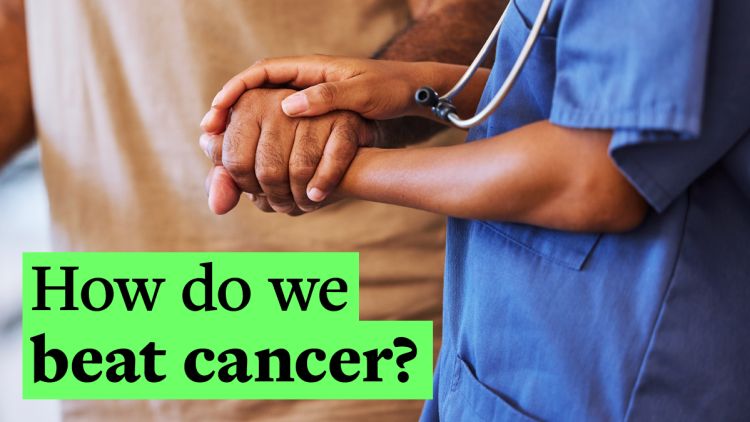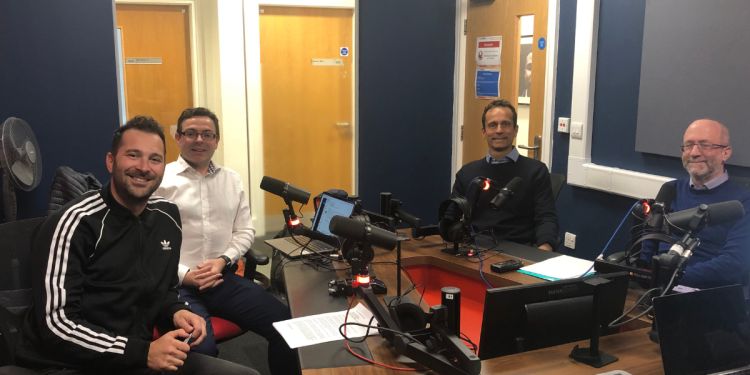Professor Richard Bayliss features on ground-breaking university podcast series ‘How to Fix…’

The final episode of the seven-part series explores what action the University of Leeds is taking to beat cancer.
Cancer will affect one in two of us.
How do we address this–can we make detection faster? What innovative treatments are being developed to eradicate the disease? And how can research unlock these answers?
Those are the questions answered by Dr. Richard Bayliss, Professor of Molecular Medicine, in the School of Molecular and Cellular Biology, Dr David Sebag-Montefiore, Professor of Clinical Oncology in Leeds’ School of Medicine and Director of the Leeds Cancer Research Centre and Dr Pietro Valdastri, Professor and Chair in Robotics & Autonomous Systems in the final episode of ‘How to Fix...”
The podcast also includes audio interviews with husband-and-wife rectal cancer patients, Trevor and Judy, who were featured in our coverage of NHS 75.
New drug discoveries
The Bayliss Lab aims to understand the molecular mechanisms that cause disease and to develop new or improved therapies.
One of their research areas is protein kinases – a type of enzyme – that are frequently mutated or dysregulated in cancer. Their research determines the structural mechanisms that underpin kinase regulation in order to develop new kinase inhibitors as potential cancer therapeutics.
But they’re not doing this alone.
“As an individual, you’re not going to understand all the elements of this complex disease, or the needs of a specific group of patients. You’re not going to understand enough to be able to come up with a really great idea.
You have to collaborate in order to innovate and to create new treatments or diagnostics.
This sense of community is felt across the university.
Professor David Sebag Montefiore’s team are pioneering a way forward to offer the best treatments for the best outcomes but with the least side-effects and a long-term impact on patients.
We all get out of bed with this mission to tackle cancer.
“We have a fantastic academic research community in Leeds. We will make faster progress by having biologists, chemists, engineers, AI and clinicians working together.”
Less invasive treatment
Also featured on the podcast is Professor Valdastri, Chair in Robotics and Autonomous Systems and Director of the University’s STORM lab.
Professor Valdastri and his team have developed an ultra-soft robotic tentacle, which measures just 2 millimetres in diameter and is able to reach some of the smallest bronchial tubes, thus transforming the detection and treatment of lung cancer.
Waiting lists are long because we need skilled operators–but robots could be the answer.
Researchers tackle global issues in “How to Fix…”
The “How to Fix…?” series brings together interdisciplinary panels of academics to discuss how their research could help to solve some of the world’s most pressing problems.
The podcasts aim to make University research and innovation accessible to as wide an audience as possible.
Other topics covered by the podcasts are violence Against Women and Girls, with a guest contribution from Alison Lowe MBE, the Deputy Mayor for Policing and Crime in West Yorkshire and food security.
The series is presented by broadcaster and alum Rich Williams, who graduated from the University in 2004 with a degree in Political Studies.
He said: “Hosting this podcast series has been an absolute privilege. To have an ear on conversations between researchers at the University of Leeds who are making a tangible difference to some of the biggest issues we face, has been extraordinary,” he said.
It’s impossible to listen to any of the episodes without feeling a sense of positivity, even in the face of some of the most challenging subjects. Prepare to be uplifted and amazed!
From left to right: Rich Williams, Prof. Richard Bayliss, Prof. Pietro Valdastri, Prof. David Sebag Montefiore.
All seven episodes of the “How to Fix…?” series are now available on both Apple Podcasts and Spotify, beginning with “How do we clean up our air?”





